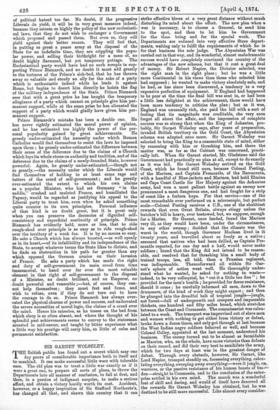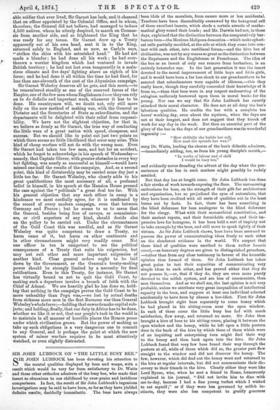of political hatred too far. No doubt, if the progressive
strike effective blows at a very great distance without much Liberals do yield, it will be in very great measure indeed, disturbing its mind about the effort. The new plan when a because they esteem so highly the policy of the new ecclesiasti- war is necessary, is to choose a General, to send him cal laws, that they do not wish to endanger a Government to the spot, and then to let him be Government which proposed and passed them. But even so, they will for the time being and for the special work. The
yield against their better reason. They will feel that, Departments are reduced into very effective Store depart- in putting so great a peace army at the disposal of the ments, waiting only to fulfil the requirements of which he is State for an indefinite time, they are crippling the popu- for that business the sole judge. The Abyssinian War was lar power, and selling their birthright for a mess of, no carried out in that way, and its wonderful, almost melodramatic doubt highly flavoured, but yet temporary pottage. The success would have completely convinced the country of the Ecclesiastical party would have had no such scruple in sup- advantages of the new scheme, but that it cost a great deal porting Prince Bismarck, and no doubt it must add greatly of money. Sir Robert Napier, the Dictator selected, was to the tortures of the Prince's sick-bed, that he has thrown the right man in the right place ; but he was a little away so valuable and steady an ally for the sake of a party more Continental in his views than those who selected him which is enthusiastic indeed while he leads it against had supposed ; he wanted to make victory absolutely safe, and Rome, but begins to desert him directly he hoists the flag he had, as has since been discovered, a tendency to a very of the military independence of the State. Prince Bismarck expensive perfection of equipment. If England had happened sees that with a great price he has bought the temporary to be poor at the time the final bill was sent in, or had been allegiance of a party which cannot on principle give him per- a little lees delighted at the achievement, there would have manent support, while at the same prise he has alienated the been more tendency to criticise the plan ; but as it was, support of a party which would gladly have given him per- England was unusually rich, she paid the bill with a sort of
manent support. feeling that its magnitude was creditable, she very soon Prince Bismarck's mistake has been a double one. He forgot all about the affair, and the impression of complete has never rightly estimated the moral power of opinion, success was se strong that when the King of Ashantee, pro- and he has estimated too highly the power of the per bably, Sir Garnet Wolseley says, after years of preparation, business. The enemy turned out to be almost as formidable as Maories, who, on the whole, have more victories than defeats SIR GARNET WOLSELEY. on their record, and did their very best to annihilate the army, able soldier that ever lived, Sir Garnet has luck, and it chanced that an officer appointed by the Colonial Office, and in whom, therefore, the General did not believe, had managed to induce 4,500 natives, whom he utterly despised, to march on Coomas- sie from another side, and so frightened the King that he was ready for any terms. Sir Garnet drew up a Treaty apparently out of his own head, sent it in to the King, returned safely to England, and so now, as Carlyle says, "strikes the skies with his astonished head." He had not made a blunder ; he had done all his work ; he had over- thrown a warrior kingdom which had ventured to invade British territory ; he had not lost even temporarily in a mala- rious climate and five days' fighting above an eighth of his force; and he had done it all within the time he had fixed, for less than one-eleventh of the cost of the Abyssinian campaign.
Sir Garnet Wolseley deserves all he gets, and this more,—to be remembered steadily as one of the reserved forces of the Empire, one of the few men whom Englishmen know they can rely on to do definite and important work, whenever it has to be done. His countrymen will, we doubt not, rely still more fully on the new method of making war, with the General as Dictator and the Secretaries of State as subordinates, and the departments will be delighted with their relief from responsi- bility. We have not the slightest objection, for that is, we believe as firmly as Sir Garnet, the true way of conducting the little wars of a great nation with speed, cheapness, and success. But we should like to point out just two points on which there seems no little likelihood that error may arise. This kind of cheap warfare will not do with the wrong man. Even Sir Garnet. had taken too few men, and but for an accident, which he forgot to acknowledge in his speech of Wednesday— namely, that Captain Glover, with greater obstacles in every way but fighting, was nearly as successful as himself—would have missed one-half the results of the campaign. And, as a second point, this kind of dictatorship may be carried some day just a little too far. Sir Garnet Wolseley, who clearly adds to his great qualifications the most necessary of all, a profound belief in himself, in his speech at the Mansion House pressed the case against the " politicals " a great deal too far. With his general objection that any such officer in camp is a hindrance we most cordially agree, for it is confirmed by the record of every modern campaign, even that between Germany and France ; but he seems to us to mean that the General, besides being free of envoys, or commission- ers, or civil superiors of any kind, should decide also on the policy to be carried out. Under the circumstances of the Gold Coast this was needful, and as Sir Garnet Wolseley was quite competent to draw a Treaty, no harm came of it, but harm on other continents and in other circumstances might very readily come. Not one officer in ten is coMpetent to see the political consequences of a Treaty that suits his exigencies, but may not suit other and more important exigencies of another kind. Clear general orders ought to be laid down by the Government, or the General's treaty-making power should be strongly limited by a necessity for final ratifications. Even in this Treaty, for instance, Sir Garnet has virtually bound us not to quit the Gold Coast, by making such a departure involve a breach of faith with the Chief of Adansi. We are heartily glad he has done so, hold- ing that nothing in the campaign proves the Gold Coast to be more unhealthy than Pegu was,—we lost by actual deaths from sickness more men in the first Burmese war than General Wolseley's whole force ;—holding that cowards make capital sub- jects; and holding, finally, that our duty in Africa has to be done, whether we like it or not, that our people's task in the world is to maintain in all manner of horrible places the Roman peace under which civilisation grows. But the power of making us take up such obligations is a very dangerous one to commit to any General, and is perhaps the point at which the new system of minor warfare requires to be most attentively watched, or even slightly distrusted.



































 Previous page
Previous page